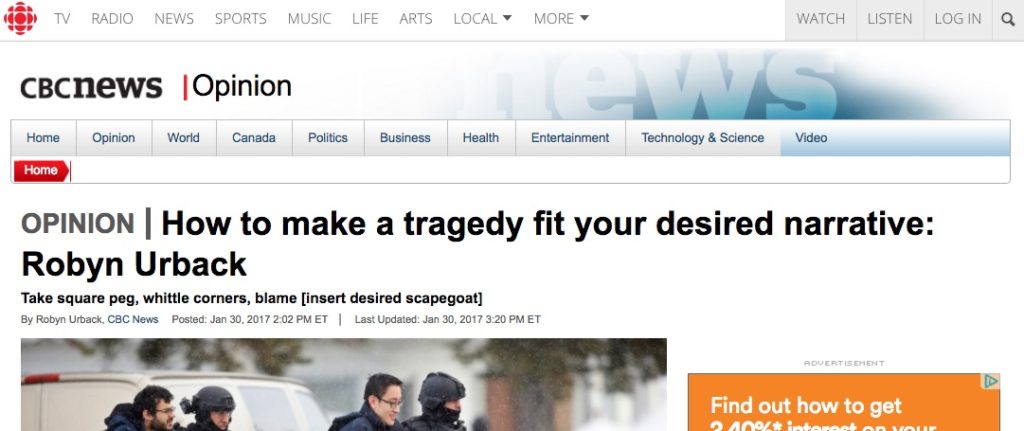
On Sunday night, as news broke that a gunman had stormed into a Quebec mosque and opened fire, people took to Twitter to get the latest information on what had taken place. Soon, word got out that there were two suspects under arrest — with one having a “Muslim”-sounding name — and that there were shouts of “Allahu Akbar” before the shots were fired. Speculation ensued, with some claiming this was an act of white supremacist terror and others pointing the finger at “radical Islam.” Police now allege that Alexandre Bissonnette acted alone and that the person they previously identified as his accomplice, Mohamed Belkhadir, was in fact a witness who called 911.
Columnists like the National Post’s Andrew Coyne and the CBC’s Robyn Urback were quick to point to the confusion surrounding the attacker’s identity as an example of the left and right engaging in the same game of premature speculation in order to prove ideological superiority. But this is a false equivalence; while it is important to wait for all information to come out in a dynamic situation, Muslims and their allies have different reasons for speculating than right-wing Islamophobes. Speculating that a white man may be responsible for a brazen hate crime is an act of self-defence, motivated by a desire to see their community’s oppression taken seriously. The far right, on the other hand, hopes to see a Muslim held responsible to push forward a bigoted narrative of a nation under attack by Islam. These identity differences may seem trivial, but one only needs look at how this attack was covered to see how the distinction manifests materially.
In the fullness of time, the evidence may confirm one theory or another, at which point whichever side it was will be able to take…
— Andrew Coyne (@acoyne) January 30, 2017
… whatever grim satisfaction that gives them. But until then for the love of God hold the speculation.
— Andrew Coyne (@acoyne) January 30, 2017
Within hours of the shooting, Islamophobic propaganda outlet The Rebel bought the domain name quebecterror.com and deployed correspondent Faith Goldy to the scene. At this point, it was still believed that there were two shooters who shouted “Allahu Akbar” and that one was of Moroccan heritage — and The Rebel was poised to capitalize on coverage of a Canadian terror attack to feed discussions for weeks to come. It did not matter that a mosque was attacked; it did not matter that the people killed were practicing Muslims; all that mattered was that the attacker was a Muslim. The false information soon spread south, where Fox News erroneously tweeted that a Moroccan had attacked a mosque and where Donald Trump’s press secretary used the attack as a justification for his Muslim ban.
When it became clear that Bissonnette acted alone, The Rebel turned to downplaying the role that white supremacy played in the attack, instead asking questions about why the narrative changed, and suggesting a police/media cover-up. While the mainstream media has generally acknowledged this was likely a hate crime, Bissonnette has had the luxury of being humanized. He is described as a “lone wolf,” as quiet and timid by his friends, and is portrayed in pictures as clean-cut and smiling. He’s been viewed with a sense of lost potential, with people asking how such a nice boy could have committed such an act — a courtesy almost never extended to Muslim perpetrators of terror. Even though both are motivated by ideology, hate crimes are seen as occurring in isolation, divorced from the white supremacist ideology that inspires them, whereas “Islamic” extremist attacks are inseparable from theirs. When it’s just a bad apple committing a crime instead of a vast ideology, it’s hard to see it as a threat to society.
The Rebel’s botched coverage (it was several hours before they posted an update to their initial report) shows the impact the identity of an attacker can have on perceptions and coverage. Even though people of colour and people with Muslim names can indeed have Islamophobic beliefs and be motivated to commit this type of violence, an attacker having a Muslim name is supposed to make us automatically complicit in our own oppression. Despite the fact that it was our people who were killed and injured, there were those who still looked for the opportunity to justify further violence and state-sanctioned repression against our communities. When the attacker is white, we are granted the privilege of having our oppression just barely recognized.
The debates and assumptions that happen during the terrifying and confusing moments after a tragedy are more than just partisan squabbles where each side gets points for being right. The identity of an attacker often has real consequences for communities that have to consistently prove their humanity to people. Depending on who it turns out to be, we either move backwards or we breathe a sigh of relief that we don’t have to spend extra time defending ourselves today. Speculation is not ideal, but when there are countless people waiting to pounce on your community based on what happens in the news, it’s more than understandable.